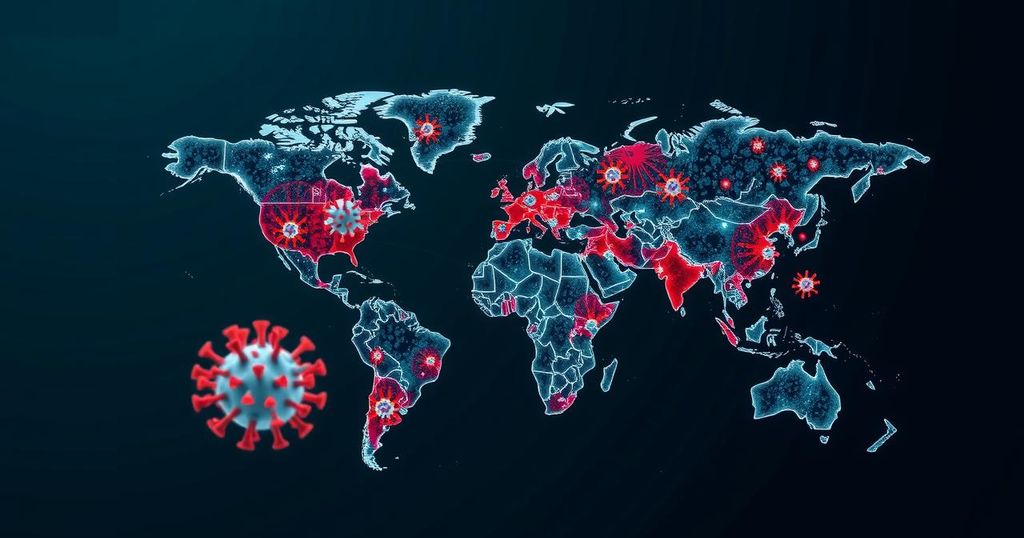The world faces significant health challenges, with 4.5 billion lacking adequate healthcare access. Key threats include mpox, cholera, and emerging COVID-19 variants, compounded by antimicrobial resistance and climate change. Experts warn that lessons from COVID-19 have not been adequately applied, raising concerns about preparedness for future pandemics. Heightened global cooperation and investment in equitable healthcare are essential to mitigate these threats and protect public health.
The ongoing global health situation reveals a concerning reality, with approximately 4.5 billion individuals lacking adequate access to essential healthcare services, according to the World Health Organization (WHO). This alarming statistic arises amid recent public health emergencies, including over 100,000 confirmed cases of mpox and at least 200 deaths worldwide, leading to the WHO’s declaration of mpox as a public health emergency. Concurrently, cholera continues to pose a serious threat, particularly in Sudan, where nearly 15,000 people have been affected and 473 fatalities reported this year. Furthermore, a new COVID-19 variant spreading across 27 countries adds to the existing health challenges. These issues are compounded by the alarming rise of antimicrobial resistance (AMR), now a leading global health threat that could result in 10 million deaths annually by 2050. Furthermore, projections suggest an additional 14.5 million deaths and $12.5 trillion in economic losses due to climate change by mid-century. The continuous stress on healthcare systems globally is expected to result in an extra financial burden of $1.1 trillion linked to climate-related impacts. Dr. Ahmed Ogwell, Vice President of Global Health Strategy at the United Nations Foundation, notes that the world currently operates at a moderate risk level concerning infectious diseases. Ogwell emphasizes the importance of maintaining heightened surveillance and global collaboration in addressing emerging health threats. He expresses concern that despite the lessons learned from the COVID-19 pandemic, critical preparedness measures have been neglected. For instance, basic health screening protocols and policy frameworks established during the pandemic have not been maintained, leading to a lack of urgency in addressing outbreaks like mpox and dengue fever. Ogwell warns that the risk of disease spread remains significant due to the interconnected nature of today’s world. He calls for international solidarity in combating outbreaks, stressing that diseases can easily propagate across borders. The geopolitical landscape further complicates global health efforts, as conflicts create environments conducive to disease proliferation. In conflict zones, poor living conditions and inadequate resources give rise to new health risks, potentially leading to the development of resistant pathogens. Climate change compounds these challenges, causing shifts in disease patterns and increasing the frequency of natural disasters that facilitate outbreaks. This situation is exacerbated by inadequate government investment in healthcare, leading to disparities in access to services, especially for vulnerable populations. Ogwell contends that the commercialization of healthcare has also marginalized those in need, underscoring the necessity for equitable health systems. In summary, the current global health landscape is precarious, with many individuals lacking necessary healthcare access and several infectious diseases threatening public health. Lessons from past pandemics have not been sufficiently applied, raising questions about preparedness for future health crises. Heightened global cooperation and systematic improvements in healthcare investment are essential to mitigate these risks and ensure better health outcomes for all.
This article discusses the significant ongoing global health challenges characterized by healthcare access disparities, emerging infectious diseases, and the impact of climate change. The focus is on the current healthcare landscape and the lessons that should have been learned from previous public health emergencies, particularly COVID-19, and how these lessons can be applied to prevent future outbreaks. The conversation with Dr. Ahmed Ogwell sheds light on the interconnected risks posed by geopolitical conflicts, antimicrobial resistance, and environmental factors contributing to health vulnerabilities across the world.
The global health situation underscores a critical need for heightened preparedness and international cooperation in the face of emerging infectious diseases and ongoing health crises. The interconnectedness of healthcare access, geopolitical stability, and climate change necessitates a unified approach to safeguard public health. Failure to apply the lessons learned from past pandemics may result in dire consequences for global health security. Enhancing investment in healthcare and establishing equitable systems is paramount in addressing the needs of vulnerable populations.
Original Source: www.aljazeera.com







